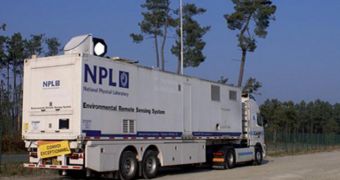News from the United Kingdom says that brainiacs at the country's National Physical Laboratory (NPL, for short) have created a mobile laboratory that is expected to soon travel all around the world and monitor air pollution in various parts of the globe.
The mobile laboratory, a picture of which is available above, is called the DIAL facility. In case anyone was wondering, DIAL stands for Differential Absorption Lidar.
Since Differential Absorption Lidar might be a tad too difficult to remember when telling others about this laboratory, the DIAL facility can also be referred to as a laser-based self-contained mobile monitoring station.
Fear not, the good news is that, if this second phrase fails to stick to one's brain too, one can always go for “fancy high-tech ride” and get it over with.
According to Business Green, the technology that this mobile laboratory relies on has until now been used to keep tabs on oil and gas emissions in Norway and methane leaks occurring at landfills in the United Kingdom.
By the looks of it, it has also been employed to collect information concerning benzene emissions originating in the Port of Rotterdam, the same source explains.
Folks with the National Physical Laboratory expect that, thanks to their DIAL facility, oil and gas companies will be able to use this technology to monitor industrial sites by creating three-dimensional maps of various pollutants present in the area.
The oil and gas companies are supposed to use data obtained in this manner to figure out what they are doing wrong and improve on their ecological footprint by reducing potentially dangerous emissions.
“Detecting and quantifying leaks from industrial sites such as refineries, gas terminals and landfills is increasingly important if we are to meet corporate, national and international emissions targets and reduce the environmental impact of industry,” explains researcher Jane Burston.
Furthermore, “Responsible businesses are keen to detect greenhouse gas leaks to reduce their impact on global warming, comply with regulation, support company environmental reporting and, in some cases, make sure they're not losing a valuable gas.”
Given the urgency to limit climate change and global warming before they have a devastating effect on human society and the natural world, several governments are now trying to twist oil and gas companies' arm into greening up their ways.
Hence, chances are that this mobile laboratory pieced together by specialists with the National Physical Laboratory in the United Kingdom will soon become surprisingly popular.

 14 DAY TRIAL //
14 DAY TRIAL //